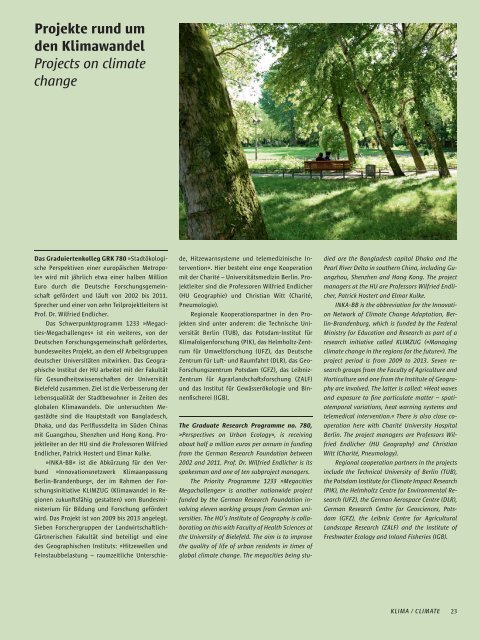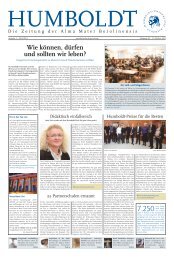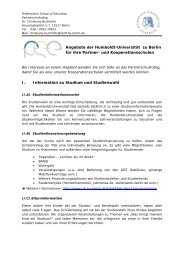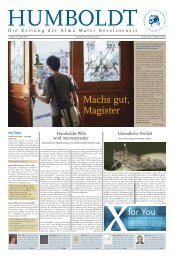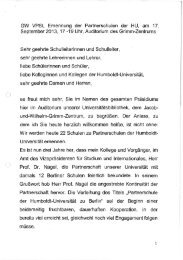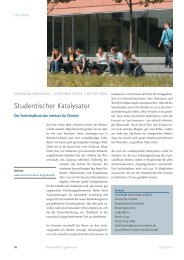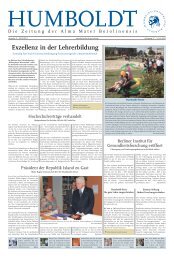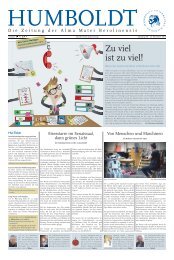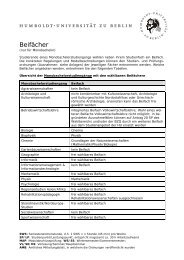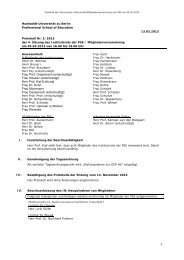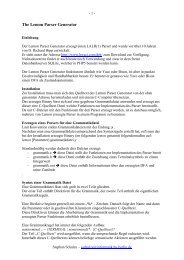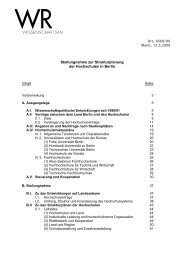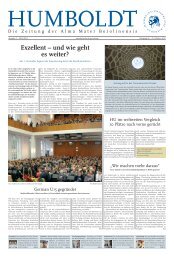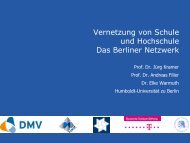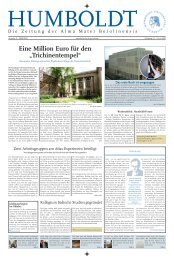hu wissen 1 (pdf) - Humboldt-Universität zu Berlin
hu wissen 1 (pdf) - Humboldt-Universität zu Berlin
hu wissen 1 (pdf) - Humboldt-Universität zu Berlin
Sie wollen auch ein ePaper? Erhöhen Sie die Reichweite Ihrer Titel.
YUMPU macht aus Druck-PDFs automatisch weboptimierte ePaper, die Google liebt.
Projekte rund um<br />
den Klimawandel<br />
Projects on climate<br />
change<br />
Das Graduiertenkolleg GRK 780 »Stadtökologische<br />
Perspektiven einer europäischen Metropole«<br />
wird mit jährlich etwa einer halben Million<br />
Euro durch die Deutsche Forsc<strong>hu</strong>ngsgemeinscha<br />
gefördert und läu von 2002 bis 2011.<br />
Sprecher und einer von zehn Teilprojektleitern ist<br />
Prof. Dr. Wilfried Endlicher.<br />
Das Schwerpunktprogramm 1233 »Megacities-Megachallenges«<br />
ist ein weiteres, von der<br />
Deutschen Forsc<strong>hu</strong>ngsgemeinscha gefördertes,<br />
bundesweites Projekt, an dem elf Arbeitsgruppen<br />
deutscher Universitäten mitwirken. Das Geographische<br />
Institut der HU arbeitet mit der Fakultät<br />
für Gesundheits<strong>wissen</strong>schaen der Universität<br />
Bielefeld <strong>zu</strong>sammen. Ziel ist die Verbesserung der<br />
Lebensqualität der Stadtbewohner in Zeiten des<br />
globalen Klimawandels. Die untersuchten Megastädte<br />
sind die Hauptstadt von Bangladesch,<br />
Dhaka, und das Perlflussdelta im Süden Chinas<br />
mit Guangzhou, Shenzhen und Hong Kong. Projektleiter<br />
an der HU sind die Professoren Wilfried<br />
Endlicher, Patrick Hostert und Elmar Kulke.<br />
»INKA-BB« ist die Abkür<strong>zu</strong>ng für den Verbund<br />
»Innovationsnetzwerk Klimaanpassung<br />
<strong>Berlin</strong>-Brandenburg«, der im Rahmen der Forsc<strong>hu</strong>ngsinitiative<br />
KLIMZUG (Klimawandel in Regionen<br />
<strong>zu</strong>kunsfähig gestalten) vom Bundesministerium<br />
für Bildung und Forsc<strong>hu</strong>ng gefördert<br />
wird. Das Projekt ist von 2009 bis 2013 angelegt.<br />
Sieben Forschergruppen der Landwirtschalich-<br />
Gärtnerischen Fakultät sind beteiligt und eine<br />
des Geographischen Instituts: »Hitzewellen und<br />
Feinstaubbelastung – raumzeitliche Unterschiede,<br />
Hitzewarnsysteme und telemedizinische Intervention«.<br />
Hier besteht eine enge Kooperation<br />
mit der Charité – Universitätsmedizin <strong>Berlin</strong>. Projektleiter<br />
sind die Professoren Wilfried Endlicher<br />
(HU Geographie) und Christian Witt (Charité,<br />
Pneumologie).<br />
Regionale Kooperationspartner in den Projekten<br />
sind unter anderem: die Technische Universität<br />
<strong>Berlin</strong> (TUB), das Potsdam-Institut für<br />
Klimafolgenforsc<strong>hu</strong>ng (PIK), das Helmholtz-Zentrum<br />
für Umweltforsc<strong>hu</strong>ng (UFZ), das Deutsche<br />
Zentrum für Lu- und Raumfahrt (DLR), das Geo-<br />
Forsc<strong>hu</strong>ngszentrum Potsdam (GFZ), das Leibniz-<br />
Zentrum für Agrarlandschasforsc<strong>hu</strong>ng (ZALF)<br />
und das Institut für Gewässerökologie und Binnenfi<br />
scherei (IGB).<br />
The Graduate Research Programme no. 780,<br />
»Perspectives on Urban Ecology«, is receiving<br />
about half a million euros per annum in funding<br />
from the German Research Foundation between<br />
2002 and 2011. Prof. Dr. Wilfried Endlicher is its<br />
spokesman and one of ten subproject managers.<br />
The Priority Programme 1233 »Megacities<br />
Megachallenges« is another nationwide project<br />
funded by the German Research Foundation involving<br />
eleven working groups from German universities.<br />
The HU’s Institute of Geography is collaborating<br />
on this with Faculty of Health Sciences at<br />
the University of Bielefeld. The aim is to improve<br />
the quality of life of urban residents in times of<br />
global climate change. The megacities being studied<br />
are the Bangladesh capital Dhaka and the<br />
Pearl River Delta in southern China, including Guangzhou,<br />
Shenzhen and Hong Kong. The project<br />
managers at the HU are Professors Wilfried Endlicher,<br />
Patrick Hostert and Elmar Kulke.<br />
INKA-BB is the abbreviation for the Innovation<br />
Network of Climate Change Adaptation, <strong>Berlin</strong>-Brandenburg,<br />
which is funded by the Federal<br />
Ministry for Education and Research as part of a<br />
research initiative called KLIMZUG (»Managing<br />
climate change in the regions for the future«). The<br />
project period is from 2009 to 2013. Seven research<br />
groups from the Faculty of Agriculture and<br />
Horticulture and one from the Institute of Geography<br />
are involved. The latter is called: »Heat waves<br />
and exposure to fine particulate matter – spatiotemporal<br />
variations, heat warning systems and<br />
telemedical intervention.« There is also close cooperation<br />
here with Charité University Hospital<br />
<strong>Berlin</strong>. The project managers are Professors Wilfried<br />
Endlicher (HU Geography) and Christian<br />
Witt (Charité, Pneumology).<br />
Regional cooperation partners in the projects<br />
include the Technical University of <strong>Berlin</strong> (TUB),<br />
the Potsdam Institute for Climate Impact Research<br />
(PIK), the Helmholtz Centre for Environmental Research<br />
(UFZ), the German Aerospace Centre (DLR),<br />
German Research Centre for Geosciences, Potsdam<br />
(GFZ), the Leibniz Centre for Agricultural<br />
Landscape Research (ZALF) and the Institute of<br />
Freshwater Ecology and Inland Fisheries (IGB).<br />
KLIMA / CLIMATE<br />
23


